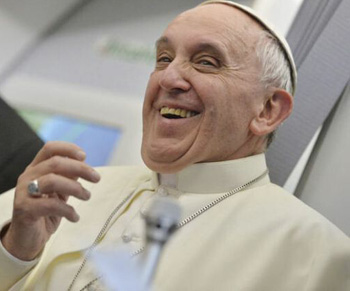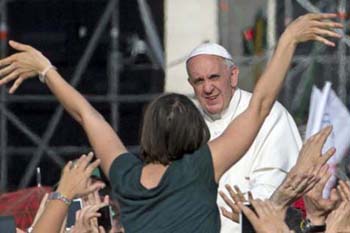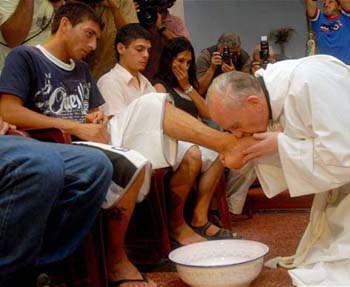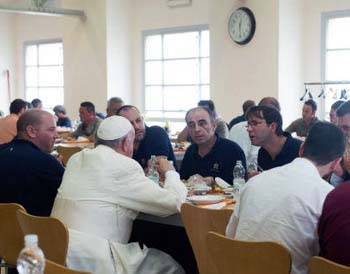Faith under Attack
 |
 |
 |
 |
 |
 |
 |
Progressivist Strategy - Part VIII
Moral Profile of the Typical Progressivist Prelate
Let us imagine a Prelate famous for his humility. His fame is the fruit of his efforts to produce this expected result by means of well-studied actions. He must have photographers to record his gestures and the media to publish the photos of him visiting a hospital, entering a line his position would normally allow him to avoid, or arriving at a Marian sanctuary to pray the Rosary and other similar things calculated to please the public.
He smiles permanently with a large, relaxed smile so that people think that he is happy and sympathetic, reflecting the right way to be Catholic.
 When he speaks, he talks about the need to be happy, relates anecdotes about his simple and humble life, and tells how, before entering the seminary, he was a young man like any other, revealing he even had a girlfriend and went to dances. He relates the things that his grandmother, mother, father or teacher told him at school. He does this to send the message to everyone that he is a man without any pretensions of superiority and that though he has a high position in the Church Hierarchy, he forgets about it and makes no use of it.
When he speaks, he talks about the need to be happy, relates anecdotes about his simple and humble life, and tells how, before entering the seminary, he was a young man like any other, revealing he even had a girlfriend and went to dances. He relates the things that his grandmother, mother, father or teacher told him at school. He does this to send the message to everyone that he is a man without any pretensions of superiority and that though he has a high position in the Church Hierarchy, he forgets about it and makes no use of it.
His studied and constant simplicity creates a sense of equality that desacralizes the authority of his ecclesiastical function. Everything about him seems to say: “My position in the Hierarchy does not make me any different from you. We are all equal.” He even speaks against the outdated structures – including the Hierarchy, if not openly, then implicitly – and of the need to change them because they prevent Prelates from being close to the people, who provide the inspiration for change.
He maintains that the Church has exaggerated the role of sorrow, since Jesus died on the Cross and won happiness for us. We only need to love Jesus, to treat Him like a brother, a friend. Our religion is false without this feeling. The encounter with Jesus is something personal that takes place inside the soul like a hidden fountain. We should always allow it to sprinkle.
The truth is found in religious experience, which is irreplaceable. To repeat memorized phrases that come from outside ourselves – regardless of the fact they are orthodox doctrine – can smash the feeling that the true Jesus is inside ourselves. The only doctrine we should follow is that which comes from reflection on our inner deep faith. This is what must tell us what we have to believe and do.
Morals cannot be an ensemble of rules that are imposed. We must be good because we feel we should. Love of neighbor is what is essential. There is no sincere morals without this unconditional love, which has no limits and is a work of the Holy Spirit. Any division or discrimination is the work of the Devil and the result of pride. We must go out into the real world and not imagine that we are in another world. We must go to the people, go outside of ourselves, moved by the feeling within us where Jesus dwells. If Jesus is not in this feeling, He is nowhere and we will preach in vain.
We should especially be with the poor. The rich believe that giving alms fulfills the law of charity, but they are deceived. They must share everything they have with the poor or their hardness alienates them from Jesus. These rich men have lost the experience of faith and their Christianity has been degraded. We must always be with the poor and defend their human rights, even if they call us “communists.”

 We should not confront those who deny God and what we consider to be moral, but be at peace with them. We can defend our ethics, but not make public demonstrations or statements against a law we consider to be bad, regardless of how bad it may be. To defend our idea of morals by protests violates the meekness we should show toward others, even if they are enemies of our faith. To do otherwise is to engage in politics, which is not our mission.
We should not confront those who deny God and what we consider to be moral, but be at peace with them. We can defend our ethics, but not make public demonstrations or statements against a law we consider to be bad, regardless of how bad it may be. To defend our idea of morals by protests violates the meekness we should show toward others, even if they are enemies of our faith. To do otherwise is to engage in politics, which is not our mission.
Nor should we try to prevent those who are atheists from publicly manifesting their thinking, even when they manifest hatred for Jesus. Let us remember how Jesus ordered Peter to sheathe his sword in the Garden of Olives. An artist labeled a “blasphemer” (an ugly word we should never use!) who exhibits obscene works with religious figures should be respected, because this is what he feels and we should live with him rather than attack him.
The world evolves; the moral conscience of cultures is increasingly alive. The times of inequality and haughty treatment have forever passed. We live in the era of fraternity, which is the only way to be Christian.
Certainly morals change, but do we not also perhaps change? If we are faithful to religion as an encounter with Jesus, which is the essence of morals, then we need not fear the changes in customs or being marginalized in society.
Does this lead us to sin? It does not matter! We must never give up in the face of evil. This is what the Devil wants. To feel oneself as being a sinner is one of the most beautiful things that can happen to a person. It is a glory. Only the great sinners have the living experience of grace. Sin is not a stain; it is a privileged place for the encounter with Jesus. Those who are obsessed with being good are the worst.
Believe in man. Raze the barriers that separate men. Let us hope that the spark of divinity that exists in each one of us will light the flame of religion. The important thing is sincerity. Even atheists have this spark inside themselves, but are unaware of it. But we, by the grace of being Christian, know it and should fraternize with them. The same applies to the followers of other religions, because they all lead to God in one way or another. God is the same for everyone. Only the hardhearted are dominated by ideologies that separate. Christianity is not an ideology, etc. etc. etc.
*
I could go on and on writing a book about this model of today’s modernist-progressivist Prelate, but it would be long and tedious. What was said above, however, is enough to see the feeling he wants to instigate and the idea to which this feeling leads. It is precisely the modernist heresy – today called Progressivism – condemned by Pope St. Pius X.

 According to this heresy, religious revelation, “must be looked for in man; and since religion is a form of life, the explanation must certainly be found in the life of man. Hence the principle of religious immanence is formulated … a vital phenomenon … that is due to a certain necessity or impulsion, but has its origin in a movement of the heart, a movement that is called a feeling.” Pascendi § 7)
According to this heresy, religious revelation, “must be looked for in man; and since religion is a form of life, the explanation must certainly be found in the life of man. Hence the principle of religious immanence is formulated … a vital phenomenon … that is due to a certain necessity or impulsion, but has its origin in a movement of the heart, a movement that is called a feeling.” Pascendi § 7)
Now then, giving that feeling is something personal and not transferable, unless through sympathy, there is no objective criterion of truth or revelation to justify it. Thus, the only thing we can conclude is that insofar as one is faithful to his feeling, he is correct and, therefore, there is no reason to say that Catholicism is the only true Religion, and still less that outside of the Church there is no salvation.
This “Jesus” that one invokes as a feeling, or sensory presence, inside himself is not, however, the Son of God made man, even when the modernist-progressivst Prelate proclaims it. It is a work of the heart based upon the aspects of the story of Jesus’ life that impressed a person. This Jesus, therefore, is basically human, and if someone makes him God, he makes a Jesus far removed from himself.
There are many manners of explaining the religious phenomenon caused by Jesus without divinizing him. We find this in Renan’s book The Life of Jesus, condemned several times, which presents Jesus as an extraordinary man, a super-man, but never as God.
In this subliminal way, skillfully manipulating feelings and making suggestive changes regarding the symbols of the Church, the progressivist Prelate generates the apostasy of Catholics and makes them adhere to the modernist-progressivist heresy. And once a person accepts one point of this heresy, as St. Pius X says, all the others require the same adhesion. Those who follow this kind of Prelate who speaks in this way loses the Catholic Faith.
Let us ask the Most Holy Virgin to intercede for us so that we, as true Catholics, do not yield before the onslaught of the worst heresy of all time presented in the most powerful and skilful form in History.

He smiles permanently with a large, relaxed smile so that people think that he is happy and sympathetic, reflecting the right way to be Catholic.

The perfect fit for the progressivist prelate: the perpetual smile
His studied and constant simplicity creates a sense of equality that desacralizes the authority of his ecclesiastical function. Everything about him seems to say: “My position in the Hierarchy does not make me any different from you. We are all equal.” He even speaks against the outdated structures – including the Hierarchy, if not openly, then implicitly – and of the need to change them because they prevent Prelates from being close to the people, who provide the inspiration for change.
He maintains that the Church has exaggerated the role of sorrow, since Jesus died on the Cross and won happiness for us. We only need to love Jesus, to treat Him like a brother, a friend. Our religion is false without this feeling. The encounter with Jesus is something personal that takes place inside the soul like a hidden fountain. We should always allow it to sprinkle.
The truth is found in religious experience, which is irreplaceable. To repeat memorized phrases that come from outside ourselves – regardless of the fact they are orthodox doctrine – can smash the feeling that the true Jesus is inside ourselves. The only doctrine we should follow is that which comes from reflection on our inner deep faith. This is what must tell us what we have to believe and do.
Morals cannot be an ensemble of rules that are imposed. We must be good because we feel we should. Love of neighbor is what is essential. There is no sincere morals without this unconditional love, which has no limits and is a work of the Holy Spirit. Any division or discrimination is the work of the Devil and the result of pride. We must go out into the real world and not imagine that we are in another world. We must go to the people, go outside of ourselves, moved by the feeling within us where Jesus dwells. If Jesus is not in this feeling, He is nowhere and we will preach in vain.
We should especially be with the poor. The rich believe that giving alms fulfills the law of charity, but they are deceived. They must share everything they have with the poor or their hardness alienates them from Jesus. These rich men have lost the experience of faith and their Christianity has been degraded. We must always be with the poor and defend their human rights, even if they call us “communists.”

Always encouraging experiencing 'the Spirit' vs. protocol; below, washing the feet of delinquents on Holy Thursday

Nor should we try to prevent those who are atheists from publicly manifesting their thinking, even when they manifest hatred for Jesus. Let us remember how Jesus ordered Peter to sheathe his sword in the Garden of Olives. An artist labeled a “blasphemer” (an ugly word we should never use!) who exhibits obscene works with religious figures should be respected, because this is what he feels and we should live with him rather than attack him.
The world evolves; the moral conscience of cultures is increasingly alive. The times of inequality and haughty treatment have forever passed. We live in the era of fraternity, which is the only way to be Christian.
Certainly morals change, but do we not also perhaps change? If we are faithful to religion as an encounter with Jesus, which is the essence of morals, then we need not fear the changes in customs or being marginalized in society.
Does this lead us to sin? It does not matter! We must never give up in the face of evil. This is what the Devil wants. To feel oneself as being a sinner is one of the most beautiful things that can happen to a person. It is a glory. Only the great sinners have the living experience of grace. Sin is not a stain; it is a privileged place for the encounter with Jesus. Those who are obsessed with being good are the worst.
Believe in man. Raze the barriers that separate men. Let us hope that the spark of divinity that exists in each one of us will light the flame of religion. The important thing is sincerity. Even atheists have this spark inside themselves, but are unaware of it. But we, by the grace of being Christian, know it and should fraternize with them. The same applies to the followers of other religions, because they all lead to God in one way or another. God is the same for everyone. Only the hardhearted are dominated by ideologies that separate. Christianity is not an ideology, etc. etc. etc.
I could go on and on writing a book about this model of today’s modernist-progressivist Prelate, but it would be long and tedious. What was said above, however, is enough to see the feeling he wants to instigate and the idea to which this feeling leads. It is precisely the modernist heresy – today called Progressivism – condemned by Pope St. Pius X.

Appearing spontaneously in a Vatican cafeteria to eat with workers; below, carrying his own suitcase onto the plane

Now then, giving that feeling is something personal and not transferable, unless through sympathy, there is no objective criterion of truth or revelation to justify it. Thus, the only thing we can conclude is that insofar as one is faithful to his feeling, he is correct and, therefore, there is no reason to say that Catholicism is the only true Religion, and still less that outside of the Church there is no salvation.
This “Jesus” that one invokes as a feeling, or sensory presence, inside himself is not, however, the Son of God made man, even when the modernist-progressivst Prelate proclaims it. It is a work of the heart based upon the aspects of the story of Jesus’ life that impressed a person. This Jesus, therefore, is basically human, and if someone makes him God, he makes a Jesus far removed from himself.
There are many manners of explaining the religious phenomenon caused by Jesus without divinizing him. We find this in Renan’s book The Life of Jesus, condemned several times, which presents Jesus as an extraordinary man, a super-man, but never as God.
In this subliminal way, skillfully manipulating feelings and making suggestive changes regarding the symbols of the Church, the progressivist Prelate generates the apostasy of Catholics and makes them adhere to the modernist-progressivist heresy. And once a person accepts one point of this heresy, as St. Pius X says, all the others require the same adhesion. Those who follow this kind of Prelate who speaks in this way loses the Catholic Faith.
Let us ask the Most Holy Virgin to intercede for us so that we, as true Catholics, do not yield before the onslaught of the worst heresy of all time presented in the most powerful and skilful form in History.

Posted August 8, 2014
______________________
______________________











